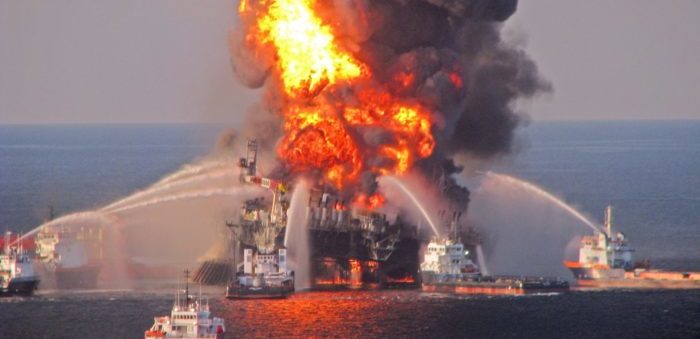The Deepwater Horizon explosion is an industrial disaster that began on 20 April 2010, in the Gulf of Mexico, resulting in 11 deaths, 17 injuries and a discharge of about 4.9 million barrels of oil into the sea, leaving a heavy legacy in the safety history of oil and gas industry.
The accident
On 20 April 2010, at about 21.50, hydrocarbons rising up from BP’s Macondo well ignited and caused an explosion on the mobile offshore drilling unit ‘Deepwater Horizon’, owned by Transocean, leased to BP, and located within US exclusive economic zone, approximately 40 miles off Louisiana.
A second explosion a bit later rocked the unit, triggering a massive fire that burned out of control. The 126 crew members were ordered to abandon the unit. They were evacuated by lifeboat and liferaft, and some even jumped from the burning unit.
According to BP’s internal investigation, a bubble of methane gas escaped from the well and shot up the drill column, expanding quickly as it burst through several seals and barriers before exploding. Survivors described the incident as a sudden explosion that gave them less than five minutes to escape as the alarm went off. The explosion was followed by a fire that engulfed the platform.
As the platform had not been able to shut in the well or disconnect from the well head, the hydrocarbons that were fueling the fire continued to flow unabated. At 1026 on April 22, ‘Deepwater Horizon’ sank into the Gulf of Mexico, leaving the well gushing at the seabed and causing the worst environmental disaster in US waters.
Fatalities & Injuries
From the 126 crew members onboard at the time, eleven remain missing despite an extensive search by USCG and are believed to have died in the explosion. Officials concluded that they may had been near the blast and unable to escape the sudden explosion. 115 were evacuated, including 17 injured men who were transferred for medical treatment.[/three_fourth_last]
Environmental Pollution
- Magnitude
The oil leak was discovered on the afternoon of 22 April 2010, when a large oil slick began to spread at the scene, but it lasted over four months. After several failed efforts to contain the flow, the well was declared sealed on 19 September 2010. However, reports in early 2012 indicated that the well site was still leaking.
FRTG estimated the initial flow rate was 62,000 barrels per day (9,900 m3/d), causing a total estimated volume of 4.9 million barrels (210 million US gal or 780,000 m3), including oil that was collected.
This makes it the world’s largest accidental marine oil spill, much larger in volume than the Ixtoc I oil spill in 1979, the former largest globally. The spill magnitude was also 20 times greater than the usual estimate of the Exxon Valdez oil spill. The oil from the disaster is estimated to have affected between 622 and 1300 miles of the US coastline around the Gulf of Mexico.
- Impact
Marine life was of course the most affected. The spill area extended to areas that are home to 8,332 species, including more than 1,200 fish, 200 birds, 1,400 molluscs, 1,500 crustaceans, 4 sea turtles, and 29 marine mammals. A 2011 study found that the spill threatened 39 marine species in addition to the 14 currently under federal protection, ranging from ‘whale sharks to seagrass”.
Through November 2010, wildlife responders had collected 8,183 birds, 1,144 sea turtles, and 109 marine mammals affected by the spill—alive or dead, visibly oiled or not.
Of course, the number of carcasses recovered was not equivalent to the number of animals actually killed: It is estimated that the actual number of deaths associated to the incident may be as much as 50 times higher than the number of recovered carcasses, according to a study published in the Journal Conservation Letters.
- The day after
A 2010 NOAA report claimed about 50% of the oil remained below the ocean surface, but independent estimations range of up to 75%. This means over 100 million US gallons (2.4 million barrels) remained in the Gulf. In April 2012, oil was still found along as much as 200 miles (320 km) of Louisiana coastline and tar continued to wash up on the barrier islands.
Probable Causes
Numerous investigations were launched to determine whose fault was the record oil spill, but USCG summarizes the key point:
The Deepwater Horizon casualty was the tragic result of a series of failures that resulted in hydrocarbons travelling up the riser and igniting onboard.
All reports pointed to a series of identifiable mistakes and especially defective cement on the well, faulting mostly BP, but also rig operator Transocean and contractor Halliburton. These mistakes reveal such systematic failures in risk management that “place in doubt the safety culture of the entire industry.”
Although the events leading to the sinking were set into motion by the failure to prevent a well blowout, the USCG and BOEMRE investigation revealed several SMS failures and a poor safety culture, as manifested in the maintenance deficiencies, training and knowledge gaps, and emergency preparedness, “that had an adverse impact on the ability to prevent or limit the magnitude of the disaster”:
- poor maintenance of electrical equipment that may have ignited the explosion,
- bypassing of gas alarms and automatic shutdown systems that could prevent an explosion, and
- lack of training of personnel on when and how to shutdown engines and disconnect the MODU from the well, to avoid a gas explosion and mitigate the damage from an explosion and fire.
USCG also said that, prior to the explosions, the platform had been found to lack compliance with established requirements for maintaining the watertight integrity of its internal compartments.
- The company leaders’ failure to commit to compliance with the ISM Code and created a safety culture throughout its fleet that could be described as: “running it until it breaks,” “only if it’s convenient,” and “going through the motions.”
- Transocean employees failed to identify the potential consequences of their decisions regarding deferred maintenance and the loss of situational awareness regarding the overall safety of the MODU.
- Flag state, the Republic of the Marshall Islands (RMI), was also blamed for ineffective oversight, through abdicating vessel inspection responsibilities: delegating all inspection activities to “recognized organizations,” without conducting onboard oversight surveys by administration officials.
Systematic failures in the Safety Management System of Transocean and DEEPWATER HORIZON rendered the system ineffective in preventing or responding to the flow of hydrocarbons in the riser and the subsequent explosion and fire. The Safety Management System failed to provide proper risk assessment, adequate maintenance and materiel condition, and process safety adherence. The Flag State and USCG did not identify these system failures in time to ensure the safety of the vessel.
Fines
In July 2015, BP agreed to pay $18.7 billion in fines, the largest corporate settlement in US history. To date BP’s cost for the clean-up, environmental and economic damages and penalties has reached $54bn. Transocean’s plead guilty to a misdemeanor charge as part of its $1.4 billion fine.
In addition to the private lawsuits and civil governmental actions, the federal government charged multiple companies and five individuals with federal crimes. None of the charges against individuals resulted in any prison time.
Lessons Learned
One of the key issues identified on the aftermath of the huge oil spill is that the whole spectrum of the scientific understanding of environmental conditions in sensitive environments as deep Gulf waters, along the region’s coastal habitats, and in areas proposed for more drilling, such as the Arctic, is inadequate. The same is true of the human and natural impacts of oil spills.
The incident highlighted that deepwater energy exploration and production involve risks for which neither oil and gas industry nor governments were adequately prepared. The key outcome of the government’s investigation of the incident was:
Because regulatory oversight alone will not be sufficient to ensure adequate safety, the oil and gas industry will need to take its own, unilateral steps to increase dramatically safety throughout the industry, including self-policing mechanisms that supplement governmental enforcement.
The extent of the pollution brought also in the spotlight the necessity of spill contingency planning by local authorities. The technology, laws and regulations, and practices for containing, responding to, and cleaning up spills lag behind the real risks associated with deepwater drilling into large, high-pressure reservoirs of oil and gas located far offshore and thousands of feet below the ocean’s surface.
As such, lack of procedural compliance and poor safety culture, combined with loose coordination among operators and regulatory bodies, was a deadly mix for eleven people, a great deal of ocean biodiversity, public health and the local economy. Moving further however from the tangible consequences of the disaster, the Deepwater Horizon is a shaking of public trust to the petroleum industry, that is still far from being restored.
The following video summarizes BP’s internal investigation on the accident:
Did you know?
- The rig ironically sank on Earth Day 2010, causing one of the largest pollutions ever.
- By June 2010, 143 spill-exposure cases had been reported to the Louisiana Department of Health and Hospitals; 108 of those involved workers in the clean-up efforts, while 35 were reported by residents. Chemicals from the oil and dispersant are believed to be the cause.
- Chemicals from the spill were found in migratory birds as far away as Minnesota.
- Prior to the spill, approximately 0.1% of Gulf fish had lesions or sores. After the spill, many locations showed 20% of fish with lesions, while later estimates reached 50%.
- Estimates of lost tourism dollars were projected to cost the Gulf coastal economy up to 22.7 billion through 2013.
- ‘Deepwater Horizon’ became a 2016 film starring Mark Wahlberg.


















































































































